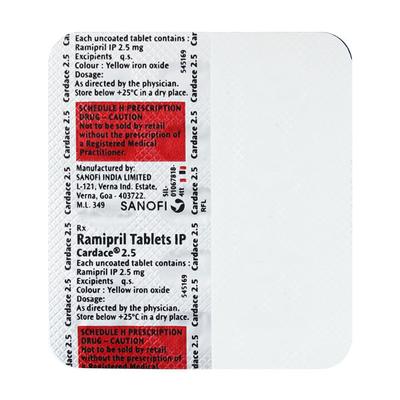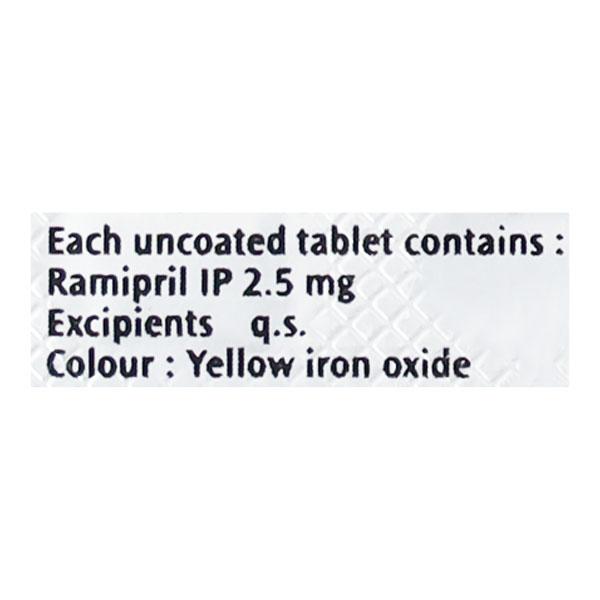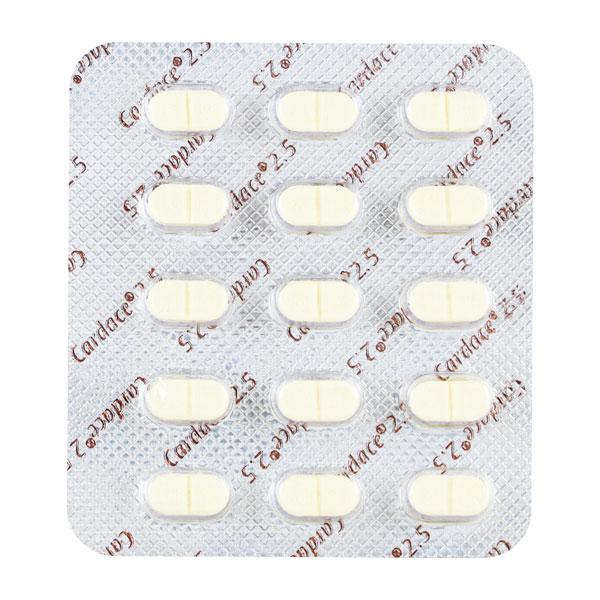

Netmeds First Membership
Quick Links
Introduction About CARDACE 2.5MG TABLET
CARDACE 2.5MG TABLET contains Ramipril, which belongs to a class of compounds known as Angiotensin-converting enzyme (ACE) inhibitors. This medication is generally prescribed under the supervision of a registered medical practitioner for cardiovascular health support and blood pressure management.
Your doctor might ask you to make certain lifestyle changes such as eating healthy, adequate sleep, weight and stress management, quitting smoking and alcohol. Your doctor may also advise you to take relevant tests before and during the management with the medicine.
CARDACE 2.5MG TABLET is not recommended for use in patients having kidney problems where blood supply to the kidney is reduced (renal artery stenosis), patients undergoing dialysis or having collagen vascular diseases (scleroderma and systemic lupus erythematosus).
If you are pregnant or breast-feeding women, consult your doctor for advice before taking CARDACE 2.5MG TABLET. It is not recommended for use in children and adolescents (under 18 years of age). The most common side effects of taking CARDACE 2.5MG TABLET are headache, dizziness, hypotension (reduced blood pressure), inflammation of the sinuses (sinusitis), diarrhea or skin rash.
Key Composition
- Ramipril
Uses Of CARDACE 2.5MG TABLET
Used to manage:
- increased blood pressure, heart failure
- the risk of getting a heart attack or stroke and slow down the worsening of kidney problems
Benefits of CARDACE 2.5MG TABLET
1. Supports healthy blood pressure levels:
- CARDACE 2.5MG TABLET contains Ramipril, which helps support the natural relaxation of blood vessels, assisting in maintaining healthy blood pressure
2. Promotes cardiovascular health:
- By helping blood vessels function smoothly, CARDACE 2.5MG TABLET contributes to overall heart health as part of a physician-guided plan
3. Easy to take once daily:
- Its convenient dosage form makes it simple to incorporate into daily routines
4. Suitable for long-term use under medical guidance:
- Often prescribed for ongoing support, CARDACE 2.5MG TABLET can be part of a long-term health management plan when monitored by healthcare professionals
How CARDACE 2.5MG TABLET Works
1. Role of ACE Inhibition in CARDACE 2.5MG TABLET
CARDACE 2.5MG TABLET contains Ramipril, which belongs to a class of medicines known as ACE inhibitors. These medicines work by gently blocking the enzyme called Angiotensin-Converting Enzyme (ACE). This enzyme plays a part in narrowing blood vessels. By inhibiting ACE, CARDACE 2.5MG TABLET helps blood vessels stay relaxed and open, allowing blood to flow more freely. This supports the body’s natural process of maintaining balanced blood pressure levels.
2. How CARDACE 2.5MG TABLET affects blood flow and vessel function
By helping blood vessels relax, CARDACE 2.5MG TABLET improves blood flow throughout the body. This eases of blood flow reduces the effort the heart needs to pump blood, which supports overall cardiovascular health. When blood vessels work efficiently, organs and tissues receive the oxygen and nutrients they need to function well.
3. Ramipril and its interaction with the cardiovascular system
Ramipril influences the cardiovascular system by targeting the renin-angiotensin system, which regulates blood vessel constriction and fluid balance. By balancing this system, ramipril encourages healthier vessel function and supports the regulation of fluid levels in the body, which can influence blood pressure and heart workload.
4. How CARDACE 2.5MG TABLET supports natural blood pressure regulation
CARDACE 2.5MG TABLET assists the body’s natural mechanisms to regulate blood pressure without abrupt changes. This gradual support helps to maintain steady blood pressure, which is important for reducing stress on the heart and blood vessels over time. Using CARDACE 2.5MG TABLET as directed under medical supervision helps promote this balanced approach to cardiovascular health.
How to use CARDACE 2.5MG TABLET
1. How to take CARDACE 2.5MG TABLET
- Take CARDACE 2.5MG TABLET exactly as advised by your healthcare provider
- It is important to follow the prescribed dose and schedule without making changes on your own
- Consistency helps maintain the intended effect on your cardiovascular system
2. Recommended Dosage and Frequency
- Take 2.5mg once daily, but this can be adjusted based on the individual health needs and how you respond to the medicine
- Your doctor may increase or decrease the dose to achieve the best results safely
3. When is the best time to take CARDACE 2.5MG TABLET
- CARDACE 2.5MG TABLET can be taken at any time of the day but taking it at the same time daily helps maintain steady medicine levels
- Some patients prefer morning dosing, while others find evening easier, consult your healthcare provider for personalized advice
Should CARDACE 2.5MG TABLET be taken with or without food?
You may take CARDACE 2.5MG TABLET with or without food, depending on your comfort. If you experience stomach upset, taking it with food might help reduce this. Consult your doctor before taking the medicine.
Things to keep in mind while using CARDACE 2.5MG TABLET
- Do not discontinue CARDACE 2.5MG TABLET without medical advice
- Inform your doctor about other medicines or supplements you are taking
- Attend all scheduled follow-ups and laboratory tests as directed by your physician
- Monitor any unusual symptoms and report them promptly
- Maintain a balanced diet and stay hydrated unless otherwise directed
What if I forgot to take CARDACE 2.5MG TABLET
- If you miss a dose, take it as soon as you remember on the same day
- If it is almost time for your next scheduled dose, skip the missed dose
- Do not double up the missed dose
- Keeping a regular schedule is important for consistent effects
Side Effects Of CARDACE 2.5MG TABLET
Common
- headache
- feeling tired or dizzy
- fainting, orthostatic hypotension (abnormally low blood pressure, especially when you stand or sit quickly)
- dry cough, inflamed sinuses
- bronchitis, shortness of breath
- stomach pain, diarrhea, indigestion, feeling sick
- skin rash
- chest pain
- cramps or pain in your muscles and joints
When to consult your doctor?
- concentrated urine (darker than usual in colour)
- confusion and fits
- faster heart rate or heartbeat (palpitations), chest pain, tightness in your chest
- shortness of breath or a cough
- blood or bone marrow problems, any sign of bleeding, purple spots, or getting infections more easily, fever, dizzy or having pale skin
- pancreatitis
- hepatitis or liver damage (fever, chills, tiredness, loss of appetite, stomach pain)
- yellowing of skin or whites of your eyes (jaundice)
Is Long-term use of CARDACE 2.5MG TABLET safe?
CARDACE 2.5MG TABLET(Ramipril) is often used for ongoing support under the supervision of a healthcare professional. When taken as directed, and with regular medical monitoring, many people use CARDACE 2.5MG TABLET for extended periods safely. Your doctor will periodically review your health and kidney function to ensure that the medicine continues to suit your needs.
When do CARDACE 2.5MG TABLET side effects usually subside?
Some mild side effects may appear when starting CARDACE 2.5MG TABLET, such as dizziness or a dry cough. These effects often lessen as your body adjusts to the medicine, typically within a few weeks. If any side effects persist or cause discomfort, it is important to discuss them with your healthcare provider.
Warning & Precautions
Pregnancy
ContraindicatedCARDACE 2.5MG TABLET is not recommended for use during pregnancy, as it may harm the baby. In humans, the use of Ramipril during pregnancy, especially in the second and third trimesters, has been linked to potential risks to the unborn baby’s kidney function and overall development.
Breastfeeding
ContraindicatedCARDACE 2.5MG TABLET is generally not recommended for use in breastfeeding women.
Driving and Using Machines
Use with CautionDo not drive or operate any machines if you feel dizzy after taking CARDACE 2.5MG TABLET.
Alcohol
Consult your doctorAvoid consumption of alcohol while taking CARDACE 2.5MG TABLET because it might make you dizzier and light-headed.
Kidney
Consult your doctorCARDACE 2.5MG TABLET is not recommended in patients with severe kidney disease (artery stenosis) or if the patient is on dialysis. It should be used with caution in patients with kidney disease.
Liver
Use with CautionCARDACE 2.5MG TABLET should be taken with caution in patients with liver disease.
Allergy
ContraindicatedDo not take CARDACE 2.5MG TABLET if you are allergic to Ramipril or any other ingredients of this medicine.
Heart Disease
Use with CautionCARDACE 2.5MG TABLET should be taken with caution in patients who have heart diseases.
Use In Pediatrics
ContraindicatedCARDACE 2.5MG TABLET is generally not recommended for use in children and adolescents (under 18 years of age).
Use In Geriatrics
Use with CautionCARDACE 2.5MG TABLET should be used with caution in elderly patients.
Other Warnings for CARDACE 2.5MG TABLET
Before taking CARDACE 2.5MG TABLET, inform your doctor if you:
- have lost a lot of body salts or fluid (vomiting, diarrhea)
- have a low salt diet
- have hyperkalemia (raised levels of potassium in the blood)
- have hyponatremia (low levels of sodium in blood)
- have to undergo desensitization (management to reduce allergy due to bee or wasp stings
- have collagen vascular disease (scleroderma or systemic lupus erythematosus)
Who should not take [GBNKEYWORD
CARDACE 2.5MG TABLET is not recommended for use if you:
- have a history of angioedema, red marks on the hands, feet and throat, swelling of the throat and tongue, swelling around the eyes and lips, difficulty in breathing and swallowing
- have diabetes
- have abnormally low blood pressure
Diet and Lifestyle Advice
Heart-Friendly Diet Tips:
- Limit High-Sodium Foods:
Reduce intake of processed foods, canned soups, pickles, and salted snacks. A low-sodium diet helps manage blood pressure naturally - Control Potassium Intake:
CARDACE 2.5MG TABLET may affect potassium levels, talk to your doctor about how much potassium you should consume. Be cautious with bananas, oranges, potatoes, and salt substitutes - Focus on Fresh Produce:
Include leafy greens, berries, carrots, and whole grains in your meals. These support vascular health and provide essential nutrients - Healthy Fats Over Saturated Fats:
Choose olive oil, avocados, and nuts instead of butter or fried foods to support heart wellness - Stay Hydrated:
Drink adequate fluids unless advised otherwise, especially if you are also using diuretics or have kidney concerns
Lifestyle Modifications to Consider
- Stay Active:
Aim for at least 30 minutes of moderate activity (like walking, cycling) most days of the week, based on your doctor’s advice - Maintain a Healthy Weight:
Losing even a small amount of weight can help support healthy blood pressure and reduce strain on the heart - Limit Alcohol and Avoid Tobacco:
Alcohol can intensify certain effects of CARDACE 2.5MG TABLET, and smoking can negatively impact heart and vessel health - Manage Stress:
Practice deep breathing, mindfulness, or light exercise to reduce everyday stress, which can influence heart function - Regular Health Monitoring:
Keep up with scheduled check-ups and monitor your blood pressure at home if advised. This helps track your progress and ensures safety
Drug - Drug interaction
Before taking CARDACE 2.5MG TABLET, inform your doctor if you are taking any of the following medicine:
1. Diuretics (Water Pills):
- Medicines like furosemide or hydrochlorothiazide, used to help remove excess water from the body, may enhance the effects of CARDACE 2.5MG TABLET, which requires careful monitoring to avoid low blood pressure or electrolyte imbalance
2. Potassium Supplements and Potassium-Sparing Diuretics:
- Using CARDACE 2.5MG TABLET alongside potassium supplements or medicines such as spironolactone can increase potassium levels in the blood, which needs to be monitored
3. Non-Steroidal Anti-Inflammatory Drugs (NSAIDs):
- Common pain relievers like ibuprofen or naproxen may reduce the effectiveness of CARDACE 2.5MG TABLET and affect kidney function when taken together for long periods.
4. Other Blood Pressure Medicines: Combining CARDACE 2.5MG TABLET with other blood pressure-supporting medicines may increase the chance of low blood pressure or dizziness
5. Lithium: Concurrent use of CARDACE 2.5MG TABLET with lithium (used for certain mood disorders) requires caution and close monitoring due to possible increased lithium levels.
6. Diabetes Medicines:
Some diabetes medications, including insulin or oral agents, might interact with CARDACE 2.5MG TABLET, influencing blood sugar levels
Synopsis
| Drug | : | Ramipril |
| Pharmacological Category | : | ACE Inhibitors |
| Therapeutic Indication | : | Hypertension, Supports heart and kidney function |
| Dosage Forms | : | Tablet, Capsule |
More Information
Comparison with similar medicine
|
Feature |
CARDACE 2.5MG TABLET(Ramipril) 2.5mg |
Enalapril (Enalapril Maleate) |
Lisinopril (Lisinopril) |
Perindopril (Perindopril Erbumine) |
|
Active Ingredient |
Ramipril |
Enalapril |
Lisinopril |
Perindopril |
|
Common Dosage Forms |
1.25mg, 2.5mg, 5mg, 10mg tablets |
2.5mg, 5mg, 10mg tablets |
5mg, 10mg, 20mg tablets |
2.5mg, 5mg tablets |
|
Typical Starting Dose |
2.5mg once daily |
5mg once daily |
10mg once daily |
4mg once daily |
|
Duration of Action |
Long-acting (once daily) |
Medium-acting (once or twice daily) |
Long-acting (once daily) |
Long-acting (once daily) |
|
Common Uses |
Supports healthy blood pressure and cardiovascular health |
Supports blood pressure and heart health |
Supports blood pressure and heart health |
Supports blood pressure and heart health |
|
Food Interaction |
Potassium-rich foods may increase potassium levels |
Similar caution with potassium foods |
Similar caution with potassium foods |
Similar caution with potassium foods |
|
Common Side Effects |
Dry cough, dizziness, fatigue |
Dry cough, dizziness, fatigue |
Dry cough, dizziness, headache |
Dry cough, dizziness, fatigue |
|
Special Considerations |
May require dose adjustment in kidney impairment |
Requires monitoring in kidney disease |
Adjust dose in kidney impairment |
Requires monitoring for electrolyte imbalance |
|
Pregnancy Category |
Not recommended |
Not recommended |
Not recommended |
Not recommended |
Why Choose Netmeds for Your CARDACE 2.5MG TABLET Purchase?
- Authentic, quality-verified medicines from licensed sources
- Convenient home delivery with discreet packaging
- Reminders for refills and repeat orders
- Option to upload prescription for pharmacist review
- Educational support and pharmacist helpline for queries
Related medicines
- RAMACE 1.25 Tablet 10's
- RAMICARE 5 Tablet 10's
- Ramipro 5mg Tablet 10'S
FAQs About CARDACE 2.5MG TABLET
Q: Can CARDACE 2.5MG TABLET be taken on an empty stomach?
A: Yes, but follow your doctor’s advice for best results.
Q: Is CARDACE 2.5MG TABLET safe for elderly patients?
A: Consult your doctor for age-specific adjustments. It may require dose monitoring based on kidney function.
Q: What should I do if I miss a dose?
A: Take it as soon as you remember. If it is close to the next dose, skip the missed one. Do not double-dose to make up for a missed dose.
Q: Can CARDACE 2.5MG TABLET be used in diabetes and kidney diseases?
A: Yes. CARDACE 2.5MG TABLET can be used in kidney disease alone or in kidney disease associated with diabetes and in diabetes without kidney disease. Your doctor might prescribe you other drugs or will be able to decide better according to your condition.
Q: Is CARDACE 2.5MG TABLET safe to take?
A: Yes. CARDACE 2.5MG TABLET is safe and effective in managing mild to moderate high blood pressure. Your doctor will be able to decide the correct management for you.
Q: Can CARDACE 2.5MG TABLET cause fast heart rate?
A: Yes. Palpitations or fast heart rate are potential side effect of CARDACE 2.5MG TABLET. Contact your doctor immediately if you feel any such symptoms after taking the medicine.
Q: What precautions do I need to follow while taking CARDACE 2.5MG TABLET?
A : Patients taking CARDACE 2.5MG TABLET must inform their doctor about their pre-existing disease conditions like kidney, heart, or liver problems as you may develop serious side effects.
Q: Can CARDACE 2.5MG TABLET cause hyponatremia?
A: Yes. CARDACE 2.5MG TABLET can lead to hyponatremia (low sodium levels in blood). Your doctor might ask you take timely blood tests to keep a check on your blood sodium levels while managing you with CARDACE 2.5MG TABLET.
Q: How should i take CARDACE 2.5MG TABLET?
A: Take CARDACE 2.5MG TABLET as advised by your healthcare provider. It is usually taken once a day with a glass of water. It may be taken with or without food, but try to take it at the same time daily for consistency. Swallow the tablet whole without crushing or chewing.
References
1. KD Tripathi. Drugs Affecting Renin-Angiotensin System And plasma Kinins. Essentials of medical pharmacology. 7th edition. 2013. Page – 503.
2. Florim Cuculi, Paul Erne. Combined neutral endopeptidase inhibitors. NIH. National Library of Medicine, National center for biotechnology information. Pubmed.gov. April 2011. [Accessed 21st August 2025] ![]()
3. Sheila A. Doggrell. Is Ramipril the pril for diabetes and kidney disease? NIH. National Library of Medicine, National center for biotechnology information. Pubmed.gov. May 2001. [Accessed 21st August 2025] 
4. M Schreiner, B Berendes, M Verho, A Langley, V Cairns. Antihypertensive efficacy, tolerance, and safety of long-term treatment with ramipril in patients with mild-to-moderate essential hypertension. NIH. National Library of Medicine, National center for biotechnology information. Pubmed.gov. 1991. [Accessed 21st August 2025] 
5. I Ramasamy. Severe hyponatraemia during therapy with ramipril. NIH National Library of Medicine, National center for biotechnology information. Pubmed.gov. Sep 2009. [Accessed on 21st August 2025] 
6. Sanofi. Electronic Medicines Compendium (EMC). [Revised in Nov 2020] [Accessed 21st August 2025] 










